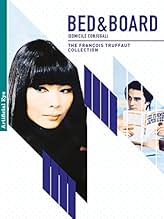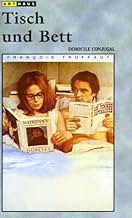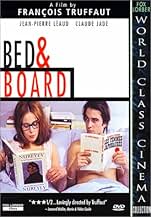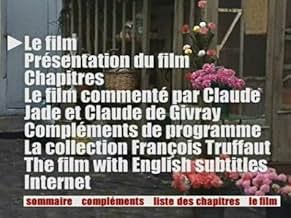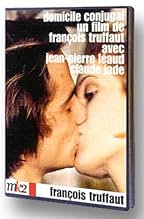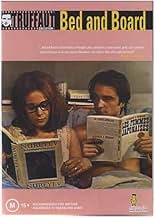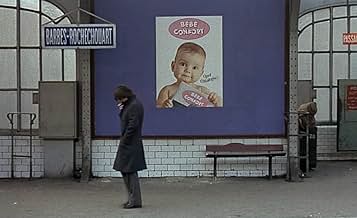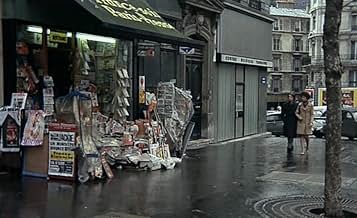Domicile conjugal
- 1970
- Tous publics
- 1h 37min
Antoine Doinel teint les fleurs mourantes de la cour devant son appartement. Il est marié à Christine qui est enceinte. Il a une liaison avec une femme japonaise, mettant en péril son mariag... Tout lireAntoine Doinel teint les fleurs mourantes de la cour devant son appartement. Il est marié à Christine qui est enceinte. Il a une liaison avec une femme japonaise, mettant en péril son mariage.Antoine Doinel teint les fleurs mourantes de la cour devant son appartement. Il est marié à Christine qui est enceinte. Il a une liaison avec une femme japonaise, mettant en péril son mariage.
- Réalisation
- Scénario
- Casting principal
- Récompenses
- 1 victoire au total
- Kyoko
- (as Mademoiselle Hiroko)
- La mère de Marianne
- (as Annick Asty)
Avis à la une
François Truffaut tells a story of ordinary betrayal, in which a perfect marriage is challenged by the narcissistic attitude of a man, too sure of the love of his wife, a sacrificial victim on the altar of his own selfishness. Claude Jade's interpretation, who embodies the loving wife, is praiseworthy, but Jean-Pierre Léaud also outlines well the evolution of his character, now in its fourth chapter. A beautiful and enjoyable film, even if the theme of betrayal, and in particular of forgiveness, in my opinion is treated with excessive superficiality.
Jean-Pierre Leaud has a physical resemblance to Truffaut. These episodic films, the ones in color that I have seen remind one of a HBO mini-series. His autobiographical Doinel is from a broken family. In the 400 blows, a masterpiece really of the New French Cinema in the late 50's, we see the lonely kid grasping for understanding. In subsequent films, we see the young adult Doinel grasp at relationship and career. The next beautiful woman is always around the corner. In Bread and Board, the femme fatale is 70's Japanese Go Go Chick, Hiroko Berghauer. Notice the heavy eye make-up on the women that make them look like zombies.
"Stolen Kisses," the preceding movie, was a romantic comedy with such a consistently sweet and charming tone that it became something more than mere fluff. "Bed and Board" maintains the same sparkling tone for about the first hour. Christine and Antoine's apartment building is inhabited by the quirkiest group of Parisians to come along until "Amélie," thirty years later. (Both movies even have an old man who refuses to leave his apartment.) Indeed, the movie, and its hero Antoine, are in love with quirkiness: Antoine works dyeing flowers and operating remote-controlled model boats, which are even stranger than the odd jobs he held in "Stolen Kisses." There are also some tenderly idiosyncratic scenes between the newlyweds.
But "Bed and Board" becomes much less interesting when it aims for a more serious tone and introduces infidelity into the plot: Antoine cheats on Christine with a Japanese woman, Kyoko. To add insult to injury, Kyoko is a blatant stereotype of the "exotic, submissive Asian woman," wearing kimono and writing calligraphy. Maybe Christine and Antoine were always a mismatched coupleChristine is very practical and bourgeois, while Antoine is a fanciful dreamerbut if he has to cheat on her, couldn't he do it with someone amusing?
Obviously the Antoine Doinel series dealt with some very serious themes in its first installment, "The 400 Blows." But that movie was a unique, distinctive look inside the head of a troubled 14-year-old boy; however, the serious themes of "Bed and Board" are found in innumerable French movies about infidelity. It's too bad that "Bed and Board" falls so flat in its second half, because its first half is whimsical comedy at its best.
From the saga of Antoine Doinel (Truffaut followed the fictional life of this character for 20 years), Bed & Board, the penultimate film in the collection, is the lightest and most entertaining, thus breaking the content of the previous ones, which were material for reflection in the character study and social situation at the time (from the late 60s to the late 80s).
Truffaut never told bad stories, and here is an example of a marriage, which, like so many others, reached the breaking point faster than previously thought, and need help to survive.
The chemistry between Jean-Pierre Léaud and Claude Jade is fabulous, with really good scenes and dialogues, even when the result is not as good as expected.
Le saviez-vous
- AnecdotesWhen Claude Véga appears, he impersonates Delphine Seyrig and quotes a line from L'année dernière à Marienbad (1961). He also quotes from a line that Seyrig spoke in the previous Antoine Doinel film, Baisers volés (1968).
- Citations
[English subtitled version]
Christine Doinel: I don't like this business of writing about your childhood, dragging your parents through the mud. I don't know much, but one thing I do know - if you use art to settle accounts, it's no longer art.
- ConnexionsFeatured in L'amour en fuite (1979)
Meilleurs choix
- How long is Bed & Board?Alimenté par Alexa
Détails
- Date de sortie
- Pays d’origine
- Site officiel
- Langues
- Aussi connu sous le nom de
- Domicilio conyugal
- Lieux de tournage
- Sociétés de production
- Voir plus de crédits d'entreprise sur IMDbPro
Box-office
- Montant brut aux États-Unis et au Canada
- 509 $US
- Week-end de sortie aux États-Unis et au Canada
- 11 206 $US
- 25 avr. 1999
- Montant brut mondial
- 509 $US
- Durée1 heure 37 minutes
- Couleur
- Rapport de forme
- 1.66 : 1
Contribuer à cette page


![Regarder Bande-annonce [OV]](https://m.media-amazon.com/images/M/MV5BMjUxOWI3YmItYTRmOC00ODFkLWEwYjQtZDc0OWFkMjk1ZmU4XkEyXkFqcGdeQXRyYW5zY29kZS13b3JrZmxvdw@@._V1_QL75_UX500_CR0)
